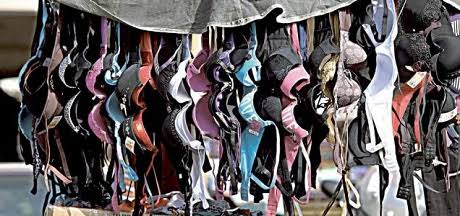![]()
Skin experts are urging women to stop purchasing used pants and bras, regardless of their affordability, warning that such items pose significant health risks.
Dermatologists have expressed concern that wearing secondhand intimate apparel without thoroughly washing or disinfecting them could lead to bacterial infections and other skin complications.
The warning comes amid a growing trend of women opting for secondhand clothing, especially intimate wear, due to the high cost of new items, a situation worsened by the ongoing economic challenges in the country.
“While soaking used underwear in hot water, bleach, and disinfectants may reduce some risks, there is no scientific evidence to guarantee that these methods completely eliminate harmful organisms,” said Dr. Nafisatu Abdullahi, a consultant dermatologist at the Federal Teaching Hospital in Katsina.
Used bras and pants, commonly sourced from secondhand markets or from neighbors and relatives, are increasingly popular due to their affordability.
However, the health risks associated with such items should not be overlooked. Dermatologists emphasize that wearing secondhand underwear can expose individuals to fungal infections, viral diseases like hepatitis and herpes, and bacterial infections such as E. coli and staphylococcus.
“Fungal spores can survive for weeks, sometimes months, on used underwear, especially if not thoroughly washed. This makes the wearer susceptible to skin infections”.
“In addition, intimate wear passed from person to person can lead to the transmission of parasitic infections like scabies and pubic lice”, Dr. Abdullahi explained
Dr. Olutomidimu Afolabi, another dermatologist, echoed these concerns, pointing out that secondhand underwear is at a higher risk of harboring sexually transmitted infections (STIs) like Hepatitis B and C, which can be spread through sweat or blood contact.
While experts agree that the economic situation in Nigeria is pushing many women to buy used bras and pants, they stress the importance of prioritizing health over savings.
“The cost of new underwear may be high, but it is always better to invest in new items to protect your health,” Dr. Afolabi advised.
In response to the rising demand for secondhand clothing, commonly referred to as ‘Okrika,’ sellers have reported an increase in sales, with many buyers citing affordability as a key reason for their purchases. However, experts warn that this trend may be contributing to a rise in preventable health issues.
For those who choose to buy used underwear despite the health risks, dermatologists recommend washing the items thoroughly in hot water, using bleach or strong disinfectants to kill harmful bacteria, and ironing all parts of the underwear.
Additionally, wearing panty liners and avoiding underwear with visible stains or strange odors can provide some protection.
“Even with these precautions, it is essential to seek medical attention if you experience any skin irritation, rashes, or discomfort after wearing secondhand underwear,” Dr. Abdullahi cautioned.
Credit: PUNCH


























jyi2zu
u78kb9
kcb6be
ul9pgh
eqkkv8